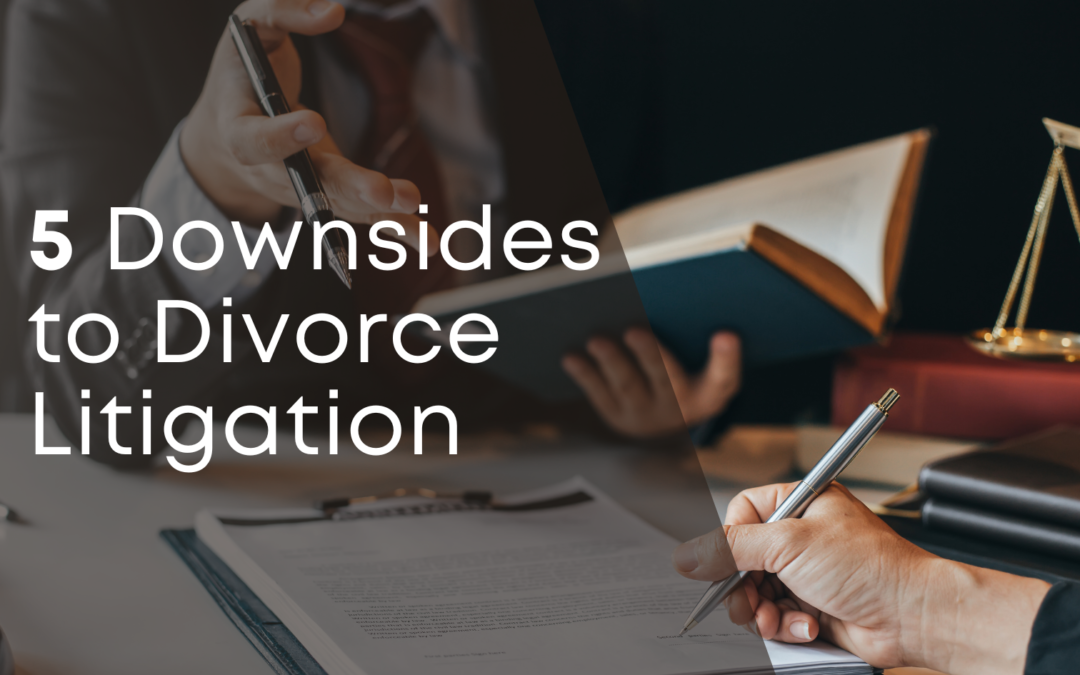People pursue litigation in a divorce for various reasons, such as wanting to “win” at all costs, seeking revenge, or feeling like they are not being heard or taken seriously in negotiations. Litigation can also be seen as a way to ensure that one’s legal rights are protected, especially when the couple has complex financial or custody issues. In many cases, divorcees think that litigation is their only option for a successful divorce, especially when there is a high-conflict situation involved.
However, it’s important to note that litigation is not always the best solution and can often lead to prolonged conflict, increased stress, and financial strain. While it’s difficult to estimate the exact number of divorces that end up in court, it’s estimated that around 5-10% of divorce cases go to trial, with the majority being settled outside of court through mediation or negotiation.
Below are five downsides of divorce litigation to consider if you or someone you love is entering into the divorce process.
1. Litigation Creates Unsustainable Outcomes
Because of the competitive nature of litigation, parties usually become angry and vengeful. They assume that they deserve everything they are asking for in a divorce. The attorneys’ job is to represent their clients’ interests, but they may not always explain that their client might be asking for something completely unreasonable. This can lead to unrealistic expectations, costly legal battles, and prolonged conflict.
In contrast, divorce mediation represents both parties’ interests fairly and honestly. A good mediator helps negotiate difficult issues while explaining the legal ramifications of those decisions. Facing reality is crucial when it comes to resolving conflict in a divorce.
2. Litigation Takes A Long Time
In California, the average divorce that involves children takes 3 to 4 years to complete, according to recent statistics. Such a long divorce litigation process can cause undue emotional stress, financial strain, and a negative impact on children who have a much longer adjustment period to deal with. In addition, the delayed closure and relational strain can make it difficult to move on with your life. In contrast to a 3,5 year litigation, the average mediated divorce takes about six months.
3. Litigation Costs Much More Than Mediation
Conservative statistics put litigation at 12 times the cost of divorce mediation. If your mediated divorce cost $7,500, it would not be unusual for your divorce to cost close to $100,000 in court. Some clients have contacted mediators after already spending $80,000+ in court with no resolution. If that is your situation, you do not need to fire your attorneys. You can keep your attorney for any future consultation.
4. Litigation Is Exhausting
Litigating a divorce can be mentally, physically, emotionally, and spiritually exhausting. When we are overwhelmed and depressed, it affects all of our relationships, our ability to work, and our ability to produce an income.
A counseling client of mine was a traumatized college student. His entire four years of high school education involved his parents screaming and yelling over their divorce while they were litigating in court. He looks back on his high school years as completely ruined. Remember, the average mediated divorce takes only six months.
5. Litigation Increases Lifelong Tension With Your Ex-Spouse
Divorce litigation can often increase lifelong tension with your ex-spouse. When a couple litigates their divorce, they typically rely on lawyers to negotiate on their behalf, and this can lead to a more adversarial process. The lawyers may take positions that are aggressive and hostile, and this can make it challenging for the couple to reach a resolution that both parties can live with. Additionally, litigation can be costly and time-consuming, and this can lead to increased stress and anxiety for both parties. All of these factors can create a situation where the couple’s relationship becomes more contentious and negative, even after the divorce is finalized. When there is a lack of communication and cooperation between ex-spouses, this can make it more challenging to co-parent children and make decisions about their upbringing. Ultimately, divorce litigation can exacerbate tension and make it more difficult for ex-spouses to move forward with their lives in a positive and productive way.
In contrast, research shows that you have a statistically significant higher chance of a more cordial and respectful relationship with your former spouse when you mediate versus when you litigate. This provides a greater opportunity for your own personal healing and wellbeing for years to come.
When it comes to divorce, it’s important to remember that your children are watching how you handle the process. Litigation can be especially stressful for children, and the long-term effects can be traumatizing. Additionally, how you and your ex-spouse interact after the divorce can significantly impact your children’s wellbeing. Personally, I went through a divorce a few years ago and opted for mediation instead of litigation. Today, my three boys are successful and well-adjusted young men, my ex-wife is happily remarried, and we all recently enjoyed a beautiful holiday celebration together with our respective partners and families. This is possible because my former wife and I are still able to communicate about our children and enjoy each other’s company at family gatherings. Unfortunately, this is rarely the case when couples litigate their divorces. Therefore, it’s important to consider alternatives such as mediation, which can lead to a quicker resolution, lower cost, and a greater opportunity for personal and familial healing.
While litigation may seem like the only option in a divorce, it’s important to consider the downsides. Mediation can provide a fair and effective alternative, leading to a quicker resolution, lower cost, and a greater opportunity for personal and familial healing.


Recent Comments